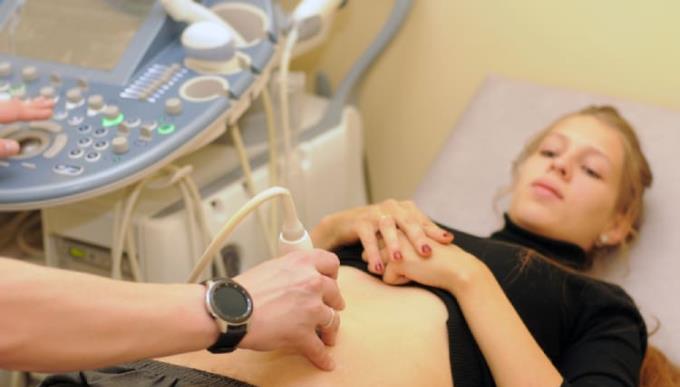An ectopic pregnancy is a rare, but life-threatening condition for a pregnant woman. Thanks to the development of medicine, doctors can diagnose ectopic pregnancy using many different methods, including ultrasound.
Ectopic pregnancy is considered a concern for both pregnant women and family in the early stages of pregnancy . In this article, aFamilyToday Health invites you to learn about this medical condition as well as how to diagnose ectopic pregnancy by ultrasound!
What is ectopic pregnancy?
An ectopic pregnancy or a ectopic pregnancy is a phenomenon when fertilized egg cells do not move into the uterus, but stick and nest on the fallopian tube wall. If not caught early, ectopic pregnancy can be a life-threatening threat for both mother and fetus, especially if the fallopian tube breaks down or other conditions are more serious.
Manifestations of ectopic pregnancy
An ectopic pregnancy can be detected early on with a routine exam or until symptoms become known. Many cases of ectopic pregnancies see a doctor with frequent vaginal bleeding or cramps in the early stages of pregnancy.
Bleeding during pregnancy can come from a variety of causes, ranging from mild to severe, which could be a sign of a miscarriage or an ectopic pregnancy. Your doctor may also detect this during a routine exam if you notice an abnormal lump in the fallopian tube area or if you have severe abdominal pain.
Methods of diagnosing ectopic pregnancy
When you suspect you have an ectopic pregnancy, your doctor may perform a number of tests to confirm or rule out this risk. Methods of diagnosing ectopic pregnancy include hCG levels test , laparoscopy, and ultrasound.
1. Concentration of hCG

hCG is a hormone that is produced early in pregnancy, as soon as an egg is fertilized and begins to move through the fallopian tubes. In normal pregnancies, hCG is produced in very large quantities by the body, and hCG levels can double in just 2-3 days. However, in women with ectopic pregnancy, hCG levels often increase very little or no change. This may be the first basis for doctors to think about the risk of ectopic pregnancy.
However, a slow rise in hCG is sometimes a sign of early miscarriage. In many normal pregnancies, hCG levels may only increase slightly. Others, despite having an ectopic pregnancy, still have a normal increase in hCG levels. Therefore, hCG levels alone cannot help prove a woman is pregnant outside the uterus or not without needing to combine other measures.
2. Laparoscopy
If you need confirmation of an ectopic pregnancy or the exact location of the pregnancy sac, your doctor can perform a diagnostic laparoscopy. This is done when you have general anesthesia . The doctor will make a small incision and place the endoscope into the abdomen. They will use the endoscope to directly examine your uterus and fallopian tubes. If an ectopic pregnancy is found, small surgical instruments can be used to remove the pregnancy bag immediately without the need for a second surgery to remove the pregnancy sac.
3. Ultrasound
Ultrasound is considered a simple method to help doctors determine if a pregnant woman is pregnant outside the uterus.
If an ultrasound reveals a pregnancy sac in the uterus, your doctor may rule out the possibility of an ectopic pregnancy causing a slow rise in hCG levels, uterine bleeding, or cramps. However, these conditions may be the result of other more serious causes such as a miscarriage, so your obstetrician may ask you to have more in-depth tests.
Conversely, if the ultrasound shows a fetal sac or fetal polarity (possibly heartbeat) appearing in the fallopian tube, this is the best evidence for an ectopic pregnancy.
However, the fetal sac usually does not show up clearly on an ultrasound scan of an ectopic pregnancy. Probe ultrasound did not detect an intrauterine pregnancy sac associated with hCG levels higher than 2,000 - 3,510 suggesting suspicion of ectopic pregnancy. For an abdominal ultrasound, the fetal sac can be detected when the hCG level reaches 6,500.
Ultrasound methods help diagnose ectopic pregnancy
1. Transducer Ultrasound (Vaginal Ultrasound)
Transducer ultrasound is the method of placing a small probe into your vagina. This probe is so small that it can be easily inserted into the vagina without a local anesthetic. This probe will emit ultrasound waves and capture images of your internal genitals (uterus, ovaries and fallopian tubes) on the screen. Thereby, the doctor can see the fertilized eggs implant in the fallopian tube, the most obvious manifestation of ectopic pregnancy.
2. Abdominal ultrasound

The doctor moves the ultrasound instrument over your abdomen. Abdominal ultrasound is usually not specific to diagnosing ectopic pregnancy because it is difficult to see the fetal sac in the fallopian tube. However, an intrauterine abdominal ultrasound combined with hCG levels may help your doctor think about an ectopic pregnancy.
What should you do if diagnosed with an ectopic pregnancy?
If your doctor confirms you are having an ectopic pregnancy but shows no signs of rupture, they may recommend medication to terminate the pregnancy or monitor additional hCG levels if found to be able to end the pregnancy. natural course of pregnancy. However, if the doctor sees a risk of rupture of the pregnancy bag, surgery may be performed to end the pregnancy.
An ectopic pregnancy occurs at a low rate but poses many serious dangers. This can lead to death for both the fetus and the mother if it is not treated promptly. If there are any abnormal signs, see an obstetrician immediately for prompt diagnosis and treatment.
You may be interested in the topic:
10 ways to raise girls to become confident and brave
Horseshoe nephropathy in children - The disease is rare and should be understood
8 Little-Known Side Effects of Fish Oil













